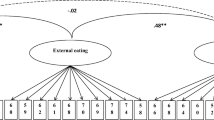Abstract
The factor structure of the Stunkard-Messick Eating Questionnaire (SMEQ) differs from that of the Dutch Eating Behavior Questionnaire (DEBQ). Using students and members of a weight watchers club, we factor-analyzed responses to the SMEQ and produced a solution which was different from that obtained by Stunkard and Messick, but which had some similarities to the factor structure of the DEBQ. “External” taste items and “internal” hunger items loaded on the same factor, a finding inconsistent with externality theory but consistent with the common sense notion of appetite strength. Although our finding suggests factor instability of the SMEQ, the stability of the DEBQ appears to be the consequence of a restricted range of DEBQ items compared with SMEQ items.
Similar content being viewed by others
References
Cattell, R.B. (1952).Factor analysis. New York: Harper.
Herman, C.P., & Mack D. (1975). Restrained and unrestrained eating.Journal of Personality, 43, 647–660.
Herman, C.P., & Polivy, J. (1975). Anxiety, restraint and eating behavior.Journal of Abnormal Psychology, 84, 666–672.
Hibscher, J.A., & Herman, C.P. (1977). Obesity, dieting and the expression of ‘obese’ characteristics.Journal of Comparative Physiological Psychology, 2, 374–380.
Kaplan, H.I., & Kaplan, H.S. (1957). The psychosomatic concept of obesity.Journal of Nervous and Mental Disease, 125, 181–201.
Kline, P. (1986).A handbook of test construction: introduction to psychometric design. London: Methuen.
Polivy, J., Herman, C.P. (1985). Dieting and binging: A causal analysis.American Psychologist 40: 193–201.
Schachter, S., & Rodlin, J. (1974).Obese humans and rats. Washington, DC: Erlbaum/Wiley.
van Strien, T., Frijters, J.E.R., Bergers, G.P.A., & Defares, P.B. (1986). The Dutch Eating Behavior Questionnaire (DEBQ) for assessment of restrained, emotional, and external eating behavior.International Journal of Eating Disorders, 5, 295–315.
Stunkard, A.J., & Messick, S. (1985). The three-factor eating questionnaire to measure dietary restraint, disinhibition and hunger.Journal of Psychosomatic Research, 29, 71–83.
Wardle J. (1987). Eating style: A validation study of the Dutch Eating Behaviour Questionnaire in normal subjects and women with eating disorders.Journal of Psychosomatic Research, 31, 161–169.
Author information
Authors and Affiliations
Additional information
Financial support for this research was given by Lilly Industries.
Rights and permissions
About this article
Cite this article
Hyland, M.E., Irvine, S.H., Thacker, C. et al. Psychometric analysis of the Stunkard-Messick Eating Questionnaire (SMEQ) and Comparison with the dutch Eating Behavior Questionnaire (DEBQ). Current Psychology 8, 228–233 (1989). https://doi.org/10.1007/BF02686751
Accepted:
Issue Date:
DOI: https://doi.org/10.1007/BF02686751



